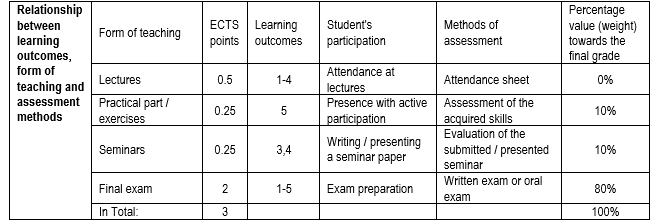The course of Physiology provides students with knowledge on basic vital functions of the body as a whole and of individual organs and tissue, in order to gain fundamental knowledge to comprehend physiologic processes in the body and to be able to follow the courses of clinical medicine easier and also to be aware of the demands of nursing. Individual functions are explained on a molecular level and on level of the body as a whole.
Haematopoiesis, the role of blood and blood cells, erythrocytes and leucocytes. Haematopoiesis and coagulation: development, features and functions of thrombocyte; the role of coagulation factor and the regulation of how a blood clot is created and dissolved. Immune reaction: the role of lymphatic tissue as defence of the body, cell and humoral immunity. Membrane and action potential, contraction of skeletal and smooth muscle: origin and potential emergence in individual cells, significance of their emergence and spreading; the structure of skeletal and smooth muscle, neuromuscular junction and contraction regulation. Heart, structure of heart muscle, regulation of heart function, impulse conduction, the role of the heart muscle as pump, heart cycle, regulation of heart function and rhythmical excitation of the heart. Physiology of circulation, blood vessels and regulation of arterial pressure, hemodynamic in arterial and venous tree and in microcirculation, mechanisms of short, medium and long regulation of circulation. The role of kidneys in producing urine and maintaining body fluids composition: structure of nephrons, glomerular filtration and tubular re-absorption, regulation of acid based and electrolyte balance in the kidneys, urinary concentration and clearance. Physiology of respiration, lung ventilation: lung volumes and capacities, gas exchange between alveoli and the bloodstream and also bloodstream and tissue, delivery of oxygen and carbon dioxide through bloodstream, regulation of breathing. Digestion, metabolism and regulation of body temperature: movement in the digestive system, secretion and absorption in the digestive system, basics of catabolic and anabolic processes, metabolism of carbohydrates, fats and proteins.
Endocrine system: organisation and regulation of the endocrine system, principles of hormonal feedback loops, hormone function of the: pituitary gland, thyroid gland, parathyroid gland, adrenal gland, parotid gland and male and female reproductive glands. Nervous system: motor and sensory nerves, role of the spinal cord, brainstem, cerebellum and the basal ganglia and the motor cortex in the control of motor skills; senses, pain; functions of the autonomous nerves system.
Obavezna literatura:
- Guyton AC, Hall JE. Medicinska fiziologija. 12. izd. Zagreb: Medicinska naklada; 2012.
- Taradi R., ur. Priručnik za vježbe iz fiziologije. Zagreb: Medicinska naklada; 2003.
Dopunska literatura:
Materijali s vježbi
Upon completion of this course, students will be able to:
1. argue the basic physiological mechanisms of homeostasis regulation;
2. valorize the role and functions of the cell and its structure, the composition of body fluids, the structure and characteristics of the cell membrane in maintaining homeostasis;
3. assess the main physiological processes in individual organ systems (nervous, locomotor, cardiovascular, respiratory, urinary, endocrine, immune, reproductive and digestive systems);
4. compare the physiological relations of individual organic systems of a healthy person; critically evaluate the principles of measuring and testing physiological functions.



